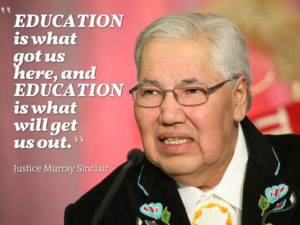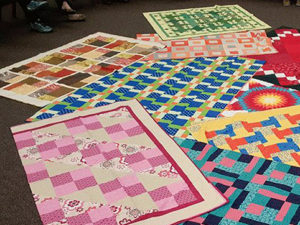Moving students to reconciliACTION!
I was excited, and a bit nervous, to deliver KAIROS’ newest campaign workshop to a group of high school students at a social justice conference in Eastern Ontario. Excited because I knew the Winds of Change campaign would resonate with youth given that it focuses on what we are and are not taught in school. Nervous because the campaign workshop needed to be adapted to fit into a 50-minute time slot and grab the attention of a young audience.
The Winds of Change campaign is pushing for every province and territory in Canada to roll out mandatory school curriculum on residential schools, Treaties and the contributions of First Nations, Inuit and Métis peoples, as recommended in the Truth and Reconciliation Commission’s Call to Action #62.i.
Our workshop guide is full of engaging and interactive tools: a bingo-game ice breaker, an interactive timeline activity, petitions and backgrounders. However, some of these tools were designed with an older audience in mind or assumed a greater level of knowledge of the issues. I wanted to find out exactly what the students knew about residential schools and the history of colonization, and so I asked them.
“Put up your hand if you were educated in the Canadian school system.” Every hand in the room went up. “Now, keep your hand up if, in school, you learned about the Indian Residential Schools System.” Half the hands went down. “Now, keep your hand up if you were taught about the Treaties and the broader history of colonization.” A few more hands dropped. “Finally, keep your hand up if you were taught in school about the contribution of Indigenous peoples to Canada, both throughout history and in the present day.” Only three hands were still up, three out of twenty.
“Wow!” I said. “We don’t learn about these things in school, do we?” I invited those with their hands raised to tell the group – in one or two sentences – what they knew about these topics. The students were reluctant at first, but soon they started to build on each other’s comments and explained what they knew about the residential schools legacy and the issues that face Indigenous peoples in Canada today.
This simple hand-raising activity from the campaign workshop guide was just the right tool for this group. And I realized that the bingo game could be easily adapted into a youth-friendly teaching tool simply by changing a few of the squares. As I pondered challenging each of the high schools represented in the room to a friendly competition to see which school could collect the most petition signatures across the school board, I realized there’s no limit to how this campaign can come to life once the creative juices start flowing.
The final activity of my workshop was perfecting the campaign pitch. I asked the students how they would convince their classmates to sign a petition asking that every student in Canada be educated on Indigenous peoples’ history and reconciliation. The students formed small groups, pored over the campaign materials for just over ten minutes, and then gathered around to hear the 60-second pitches. Some were high energy, others more earnest. One group even turned their pitch into a rap song! I knew we were getting somewhere.
Reconciliation is going to take time. It will be challenging. But there is no reason it can’t involve a rap song, youthful energy and engaging the next generation in political action. In fact, it’s the only way things are going to change.
by Ian Thomson










